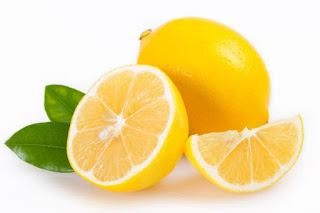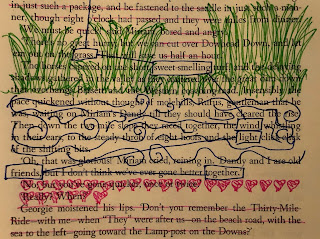This month's challenge was to compose a zentangle poem. Kat Apel does a really nice job describing them on her site. This is similar to blackout poetry, though doodles and lines are used to block and frame the words.
All of these poems come from pages found in Maugham's Choice of Kipling's Best, published by Doubleday & Company in 1953. I found this at a thrift shop, so even though it sets my teeth on edge to destroy a book, I've committed to using this one for experimenting with this form.
When we met on Sunday I chose a page and wrote all the words that looked promising for a poem, in order, on a large sheet of paper. I underlined words that I thought might work together, and wrote a poem. Then I went back with another color and tried again.
When I felt like I had something, I boxed the words on the page. Sara suggested connecting the words, so I did, hoping for some organic shape to appear.
Here's the poem.
Evening
smoke and shadow lay long
woods full of scents and sounds
pretty things lark about
sit still
enjoy
Of course, after I boxed them, I realized I didn't like the ending and should have done something different after "lark about," so I abandoned this one.
Before we met, I experimented with a page and a poem, but it's too busy and the words got lost, though I liked where the poem was going.
The hearts and flower are a bit much. Here's the untitled poem.
lovingly connected
without a word
caught in his eyes
hearts beating slowly
hands dropped
spoke
good enough to
fill the silence
I wish that had been hearts beating quickly, but you can't change the words or the order in a poem like this, so it can be very frustrating. Perhaps this is a good way to generate a first draft of a poem.
The poem I landed on doesn't feel very zentangle-ish, but it's what I've got. Here is the page, some closeups, and the poem.
summer day
simple things
song
grass, sweet smelling
wind, light
friends together
My poetry sisters know that this last week has been hard. I've been struggling with some health issues, but in the midst of it all, my mother fell, had surgery, then suffered a stroke. She declined rapidly and was placed in hospice care on Tuesday. She has not woken since Wednesday. I can't be with her and am heartbroken about it. I'm finding it hard to write poems now, but I did manage this zentangle for her.
For JuneI remember lots of things
the sea
dreams
your life
laugh
soul
I have loved you
every minute
mother mine
Poems ©Tricia Stohr-Hunt, 2021. All rights reserved.
You can read the pieces written by my Poetry Sisters at the links below.
Would you like to try the next challenge? Next month we are writing villanelles on the topic of dichotomy - or, true opposites, if you will. Bifurcations. Incongruities. Paradoxes. Contradictions. We're talking Luke/Darth (or is that a false dichotomy, and they're two sides of the same coin??? Discuss), real/imagined, civilized/savage, winter/summer, function/dysfunction. Interested? Good! You've got a month to craft your creation(s), then share your offering (or someone else's) with the rest of us on July 30th in a post and/or on social media with the tag #PoetryPals. We look forward to reading your poems! (Thanks to Tanita for writing this bit!)
I do hope you'll take some time to check out all the wonderful poetic things being shared and collected today by Linda Mitchell at A Word Edgewise. Happy poetry Friday friends.






















